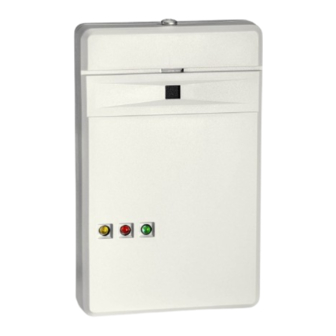
Table of Contents
Advertisement
Quick Links
FG-730-001-V0
The FG-730 is a dual technology glassbreak detector that uses
flex detection and audio discrimination to detect breaking glass.
The flex and audio technologies are sensitive to different
frequencies. The flex technology is sensitive to ultra low
frequencies, the type generated by a blow to a glass window. The
audio technology detects the frequency of breaking glass.
The audio technology remains off until the flex technology
detects a blow to the glass. For an alarm condition to occur, the
audio must detect the frequency of breaking glass within a
defined time-window after the flex detects a blow to the glass.
Because both technologies must detect and verify glass
breakage, false alarms are virtually eliminated.
FEATURES
Dual flex/audio technology
•
Low 10 - 14 VDC operation
Low 25 mA at 12 VDC
•
current draw
No adjustment on audio
•
• Adjustment on flex
detection to fit
characteristics of each
location
MOUNTING LOCATION
The unit must have a direct line of sight to, and a clear view
•
of, the protected glass.
Locate the FG-730 within 30' (9 m) of the glass to be
•
protected.
Curtains, blinds, and other window coverings will absorb
•
energy from breaking glass. Heavy curtains, for example, will
effectively block the sound signal. In these cases, mount the unit
on the window frame behind the window covering, or above the
window. Make sure to test the unit thoroughly for proper
detection.
Do not mount the unit in front of air ducts or forced air fans, or
•
close to bells measuring 2" (5 cm) or larger in diameter.
MOUNTING PROCEDURE
Orient the unit as shown in Figure 1. Remove the screw located
at its top. While depressing the latch near the top of the unit, swing
the front cover forward. Use the back cover as a template to mark
holes for the mounting screws and wiring, then drill the holes.
Note: If you plan to corner-mount the unit, remove the printed
circuit board before marking and drilling holes for the
mounting screws.
Installation Instructions
Model FG-730
30' range
•
Indicator LEDs
•
Energized form C alarm
•
relay
Circuit protection
•
Cover tamper switch
•
Noise burst rejection circuit
•
RFI immunity
•
• UL listed
Dual Technology Glassbreak Detector
Pull the wiring into the unit through the back cover. Using the two
mounting screws, mount the rear housing at the desired
location.
After removing screw at top of
unit, depress this latch to open
housing
WIRING
Observing the proper polarity, wire the unit as shown in Figure 2
(use 22 to 14 AWG). Reverse-polarity connections will not
damage the unit.
Tamper
Form A (NC)
50 mA, 30 VDC
Alarm
Form C
500 mA max, 30 VDC max,
30 VA max
Power
10 - 14 VDC
25 mA, 12 VDC
FLEX ADJUSTMENT
To adjust the flex technology: Use a screwdriver to set the flex
sensitivity control (R5) at MAXIMUM by turning it all the way
clockwise. Refer to Figure 3 on the back side of this page.
Turn on any heating/air conditioning system in the vicinity and
observe the yellow flex LED (DS2) for approximately one minute.
Excessive subsonic (inaudible) noise typically produced by air
handling systems may cause the flex LED to flash randomly.
If it flashes randomly, turn the R5 control counterclockwise just
until the flashing stops.
TESTING THE FG-730
Use the FG-701 Glassbreak Simulator to test the FG-730
detector. The FG- 700 may also be used.
Activate the simulator in MANual mode at the farthest point of
the glass to be protected (30' maximum). If the green LED (DS1)
on the detector flashes, the audio technology will detect
breaking glass at that distance.
Test the flex technology by carefully striking the glass with a
cushioned tool. If the yellow LED on the detector flashes, the flex
technology will be sensitive enough to detect a blow to the glass
at that distance.
FlexGuard
®
REAR HOUSING
For surface mounting
For corner mounting
(score and pull flap open)
FRONT HOUSING
FG-730
Knockouts
NC
C
NO
C
NC
V -
V+
Advertisement
Table of Contents

Summary of Contents for resideo FlexGuard FG-730
- Page 1 FlexGuard ® FG-730 Dual Technology Glassbreak Detector Installation Instructions Pull the wiring into the unit through the back cover. Using the two mounting screws, mount the rear housing at the desired location. After removing screw at top of REAR HOUSING unit, depress this latch to open For surface mounting housing...
- Page 2 For the latest warranty information, please go to: resideo.com For patent information, please go to: www.resedio.com/patent 2 Corporate Center Drive, Suite 100 P.O. Box 9040, Melville, NY 11747 © 2019 Resideo Technologies, Inc. www.resideo.com Ê5-051-169-00KbŠ 5-051-169-00K 7/14 Rev. K...














Need help?
Do you have a question about the FlexGuard FG-730 and is the answer not in the manual?
Questions and answers